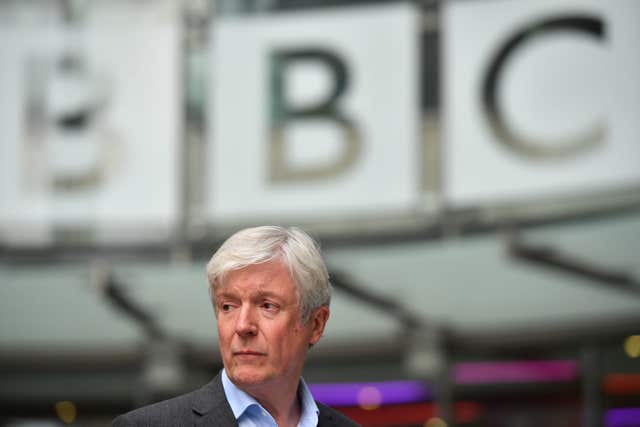
Free TV licence fees for over-75s are to be means-tested, the BBC has announced.
Households without someone who receives Pension Credit will now have to pay for the licence.
BBC director-general Tony Hall said the move was “not an easy decision”.
From June 2020 around 3.7 million households which previously received a free licence will now have to pay for one.
It is thought 1.5 million households will be eligible for the free licence under the new scheme, which will cost the BBC around £250 million by 2021/22 depending on the take-up.
READ MORE: BBC licence fee to rise by £4 to £154.50
Licence fees were being reviewed by the BBC, with the full cost of concession due to be passed to the corporation from government in June 2020.
Facing financial pressures and attempting to streamline, the BBC has said previously that shouldering the burden of free licences would “fundamentally change” the broadcaster.
 BBC director-general Tony Hall told MPs in 2018 that licence fees would be reviewed (Ben Stansall/PA)
BBC director-general Tony Hall told MPs in 2018 that licence fees would be reviewed (Ben Stansall/PA)
The threat of scrapping the free licence drew criticism from campaigners who stressed its importance for the elderly.
Lord Hall has announced that licence fees will now be linked to Pension Credit and will be means-tested.
“This has not been an easy decision,” he said. “Whilst we know that pensioner incomes have improved since 2000, we also know that for some the TV licence is a lot of money.
“I believe we have reached the fairest judgment after weighing up all the different arguments.
“It would not be right simply to abolish all free licences. Equally, it would not be right to maintain it in perpetuity given the very profound impact that would have on many BBC services.
“This decision is fairest for the poorest pensioners. Around 1.5 million households could get free TV licences if someone is over 75 and receives Pension Credit. It protects those most in need.
“And importantly, it is not the BBC making that judgment about poverty; it is the Government who sets and controls that measure.
“It is fairest for all audiences – of all generations, old and young – who we know value the BBC and the programmes and services we provide. It means these services can continue.”
The corporation was due to take over the cost of free TV licences as part of its new charter agreement which commenced in 2017.
READ MORE: Decision to give free TV licences for the over-75s should not be made by the BBC says Gordon Brown
The shift from government to the broadcaster was being phased in, with sole responsibility set to begin from 2020, when it was estimated to cost the BBC around £725 million.
Pensioners had protested at the possibility of the concession being scrapped, and concerns were raised by some MPs over removing the free licence.
It has been argued that the elderly are more likely to watch BBC programmes, which can act as a from of companionship and an antidote to social isolation.
Campaigners have also claimed that many older people in the UK struggle financially, and would find it difficult to pay the full fee.
Chairman of the BBC Sir David Clementi said: “Linking a free licence for over-75s to Pension Credit was the leading reform option. It protects the poorest over-75s, while protecting the services that they, and all audiences, love.
“It is the fairest and best outcome. It is one we can implement and endorse. This is an outcome that is the fairest possible in difficult circumstances.”



Why are you making commenting on The Herald only available to subscribers?
It should have been a safe space for informed debate, somewhere for readers to discuss issues around the biggest stories of the day, but all too often the below the line comments on most websites have become bogged down by off-topic discussions and abuse.
heraldscotland.com is tackling this problem by allowing only subscribers to comment.
We are doing this to improve the experience for our loyal readers and we believe it will reduce the ability of trolls and troublemakers, who occasionally find their way onto our site, to abuse our journalists and readers. We also hope it will help the comments section fulfil its promise as a part of Scotland's conversation with itself.
We are lucky at The Herald. We are read by an informed, educated readership who can add their knowledge and insights to our stories.
That is invaluable.
We are making the subscriber-only change to support our valued readers, who tell us they don't want the site cluttered up with irrelevant comments, untruths and abuse.
In the past, the journalist’s job was to collect and distribute information to the audience. Technology means that readers can shape a discussion. We look forward to hearing from you on heraldscotland.com
Comments & Moderation
Readers’ comments: You are personally liable for the content of any comments you upload to this website, so please act responsibly. We do not pre-moderate or monitor readers’ comments appearing on our websites, but we do post-moderate in response to complaints we receive or otherwise when a potential problem comes to our attention. You can make a complaint by using the ‘report this post’ link . We may then apply our discretion under the user terms to amend or delete comments.
Post moderation is undertaken full-time 9am-6pm on weekdays, and on a part-time basis outwith those hours.
Read the rules hereLast Updated:
Report this comment Cancel